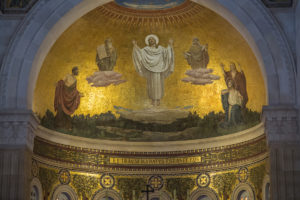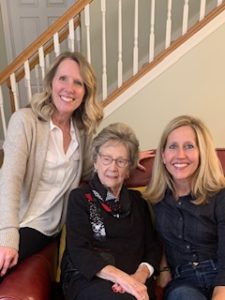
Today’s reading: Numbers 19-21, Colossians 4
In my Life Application Study Bible, the heading for Numbers 20 is A New Generation. By this point, it had been 40 years since the Exodus from Egypt. While all the people who lived in Egyptian captivity had almost died off, it doesn’t seem like much had changed. The next generation was still grumbling and blaming Moses, their leader, for everything they didn’t like. In this specific instance, they were frustrated because there was no water in the Desert of Zin where they were camping.
They quarreled with Moses and said, “If only we had died when our brothers fell dead before the Lord! Why did you bring the Lord’s community into this wilderness, that we and our livestock should die here? Why did you bring us up out of Egypt to this terrible place? It has no grain or figs, grapevines or pomegranates. And there is no water to drink!” (Numbers 20:3-5).
When I look at the context, I understand the stress. This distance from Egypt to Canaan, “The Promised Land”, was only 40 miles. It shouldn’t take that long to walk there, even if you are walking with 600,000 other people. However, God’s people had been wandering the desert for 37 of the last 40 years, making no real progress toward their destination, and grumbling the entire way. I’m sure Moses was frustrated with the people he was leading and frustrated with God. On top of that, notice that Numbers chapter 20 starts off by telling us Miriam, Moses’ wife, had died. In spite of his immense sadness and stress, Moses continued to carry out his responsibilities as leader and chief problem solver by seeking God’s answer to their water problem.
The Lord said to Moses, “Take the staff, and you and your brother Aaron gather the assembly together. Speak to that rock before their eyes and it will pour out its water. You will bring water out of the rock for the community so they and their livestock can drink” (Numbers 20:8).
Like he had done time and time again over the last 40 years, God performed a miracle through Moses and took care of his people’s needs.
So Moses took the staff from the Lord’s presence, just as he commanded him. He and Aaron gathered the assembly together in front of the rock and Moses said to them, “Listen, you rebels, must we bring you water out of this rock?” Then Moses raised his arm and struck the rock twice with his staff. Water gushed out, and the community and their livestock drank.
But the Lord said to Moses and Aaron, “Because you did not trust in me enough to honor me as holy in the sight of the Israelites, you will not bring this community into the land I give them” (Numbers 20:9-12).
Look closely. This time the end result was different. God was displeased with Moses and told him that, despite his job of leading God’s people to The Promised Land, he was not going to get to enter with them. Why? Because this time Moses took credit for the miracle instead of giving credit to God.
I’m not sure about you, but in spite of the circumstances, this punishment seems pretty harsh to me. Moses had been leading God’s people, solving their problems and listening to them complain for 40 years. During a time of immense stress and sadness, Moses makes a mistake and God has no mercy? What gives?
Two things to remember. 1) God is a God of justice and mercy. Choices that are against God’s plan have consequences. While God is willing to offer forgiveness, he does not always protect us from the consequences of our actions. That is how we learn. 2) God holds leaders to a higher standard because of the influence they have on other people.
Since an overseer manages God’s household, he must be blameless— (Titus 1:7).









